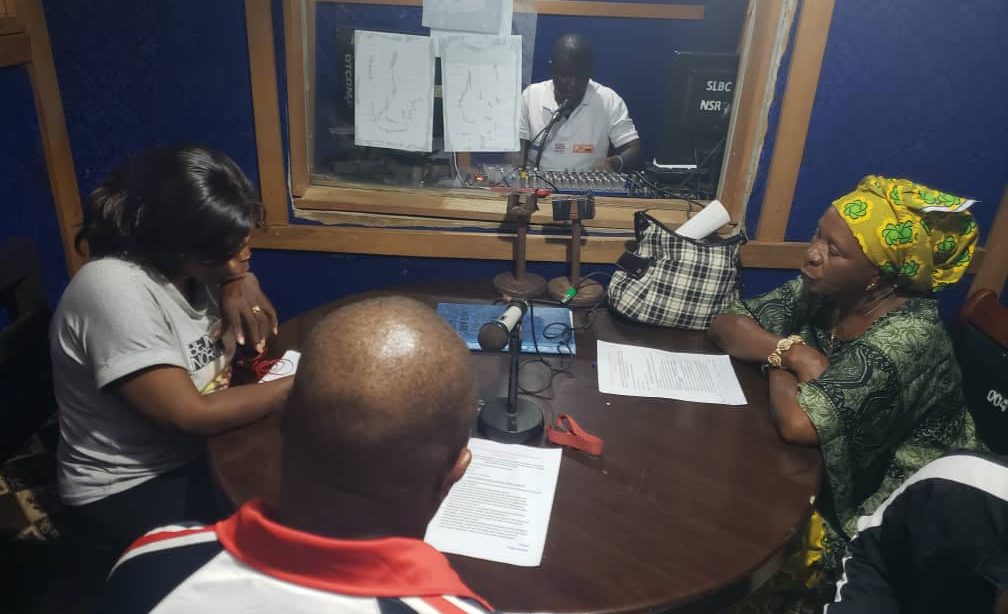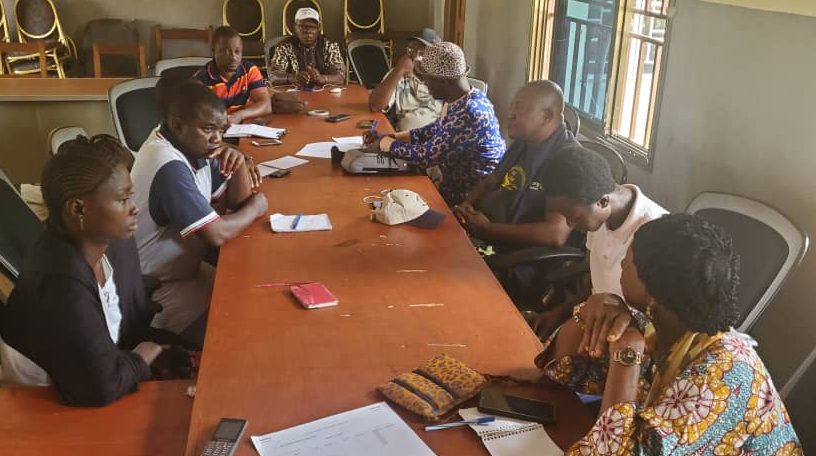
Community health experts recording a program at a radio station in Moyamba, Sierra Leone
Community ownership and participation: Studying health systems governance in Moyamba, Sierra Leone
21 March 2024
Halimatu Kamara of ReBUILD for Resilience’s Institute for Development team (IFD) in Sierra Leone reflects on her visit to the team’s learning site in Moyamba District. There she experienced community ownership, inclusivity, and holistic participation from different community stakeholders who meet at the District Health Management Team (DHMT). The stakeholders meet to discuss community health issues and support each other in taking collaborative action to address problems in their district.
Halimatu met the District Medical Officer (DMO) before taking part in a stakeholder meeting to hear voices from across the community.
“Work with community leaders to address shocks, increase inclusivity, accountability and trust, and support health system resilience in Sierra Leone”
“Community deaths are unacceptable,” stated the DMO in Moyamba District, Dr Prince Masuba. Along with other local decision-makers, he is supportive and encouraging of the ReBUILD research that is ongoing in the district. He understands the need to engage communities and the benefits of using this approach to address issues of concern. He believes that stakeholder meetings are key to understanding the needs and issues across the district, and sometimes chairs the meetings so other stakeholders would realize their importance.
To address the mortality rate, a collaborative working approach has been adopted. This has had some success, reducing maternal and child mortality. However, the DHMT wants to see a greater reduction in these and other deaths in the coming years. They hope to achieve this and other health targets via radio discussion programs, supported by ReBUILD, through which they reach out to the community on health issues. For example, pregnant women might be told about why and when they should attend healthcare facilities.

Community stakeholders from Moyamba gather to discuss the health challenges facing their district and potential solutions
Community issues of concern
The stakeholder meetings consist of people from various walks of life, such as members of the DHMT, a One Health coordinator, a veterinary officer from the Ministry of Forestry, representatives from the Chiefdom, traditional healers, inter-religious representative, a market women representative, a civil society officer, a local council representative, and a representative of the Office of National Security personnel. During the meeting, they discuss various issues affecting their community including malaria, waste management (litter, dumps and waste burning), water pollution from small-scale mining companies, the threat of diseases from neighboring countries, access to toilets, sexual violence against young women, teenage pregnancy, pest control, dog bites, Water Sanitation and Hygiene (WASH) in school, and breastfeeding. It was amazing to see community members discussing and working collaboratively to address their problems.
In the meeting, one of the stakeholders raised issues surrounding the availability of ambulance services for the referral of pregnant women to the health facility. He said, “Where are the ambulances?” There should be six but only one is functional. The focal person for ambulance services explained the challenges around fuel availability and mechanical issues, and those present discussed how they could collaboratively offer solutions to these problems. They unanimously agreed to address it as a team by advocating to higher-level authorities in the Ministry of Health.
The chairman of the stakeholder meeting spoke about the community bed net distribution program that is to be rolled out in the district. He emphasized the role of those present in ensuring every household registers to receive a bed net during the campaign. “We nor go tire, we press on,’’ he said.
Water Sanitation and Hygiene (WASH) in schools is a serious concern for the stakeholders, and so they offered to visit schools to provide health talks to pupils and also to the food sellers in the school. Poor toilet facilities are a health hazard in the community, and in the meeting, they agreed on levying fines on those who fail to construct good toilet facilities.
During the meeting I saw the stakeholders discussing issues of immediate concern, taking ownership of and addressing their problems. A WhatsApp forum is also used to prioritize and discuss issues. The radio discussion program is critical to the community’s prevention and control strategies, with targets including improvement in the under-five mortality rate (currently 135 per 1000 live births), increased antenatal and post-natal care attendance (currently around 90% and 70.9% respectively), more households sleeping under bed nets (now 85.2%), a reduction in teenage pregnancy (currently around 31%), an increase in access to basic sanitation services (currently 19.7%), and an increase in women aged 15-49 completing secondary education (currently less than 5%).
Radio programs
The radio programs are usually held at the Heart FM 95.9 or MODCAR radio station in Moyamba. They were initially held for one hour, four times in a month, but following requests from community members the radio discussions have been extended to two hours and are now held twice a month.
These are interactive shows, featuring a local expert. For instance, if the radio discussion is around Malaria control and prevention, the DHMT malaria focal person and other knowledgeable stakeholders would be at the radio station for discussion. They use the program to disseminate key messages on the topic under discussion, e.g. “always sleep under a bed net”, after which they would welcome phone calls and text messages from the community who ask questions on malaria control and prevention.
These radio programs are very popular, with many calls and texts from the community during the show, and have helped the DHMTs make strides in health promotion in their district. This has successfully reduced the health knowledge gap that used to exist between the DHMT and the community.
Community ownership
A bottom-up, stakeholder-focused approach is one of the means the DHMT is using to ensure they are improving health in the district. Laws and policies are in place but when it comes to effective implementation of health interventions, community ownership is key. The members can use the forum to work with others and suggest solutions to some of the issues at hand. One example involves religious leaders inviting a stakeholder to their church and mosque to disseminate information on issues of concern to their congregations. This and other interventions are helping the DHMT and local community strengthen their district health system.
Further information
There’s more on the Sierra Leone learning site and the work taking place there here.